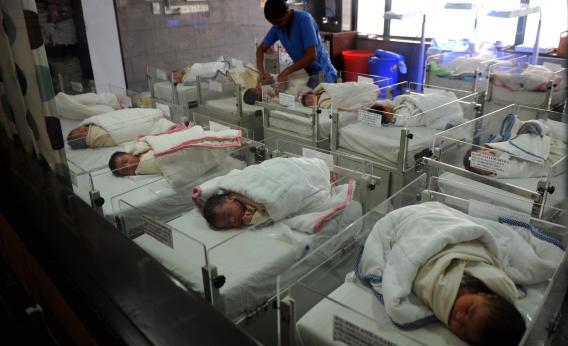This question originally appeared on Quora.
Answer by Dan Holliday:
All modern societies evolved out of agrarian societies. Before the Industrial Revolution, the male endurance value and physical strength translated directly to political power. Men fought in wars, hunted beasts, erected buildings, and plowed fields PRECISELY because they possessed the physical stamina to do so at a far greater degree than females.
I’m a HUGE fan of saying, “History does not occur in a vacuum.” Which is a fancy way of saying, “S*** throughout human history happens for VERY good reasons.” Back before the Industrial Revolution, human fertility was the highest premium factor in existence. People lived to have babies, and babies were the most important thing men and women brought into the world. The female role in reproduction—shall we say—involves a lot more time, effort, and pain (and before recently, a hell of a lot of death). Every moment women spent pregnant (which was a LOT of time) was time that she would have been taken away from power-playing.
This was for a very good reason, reasons that no longer exist (and a reality we now live in that we take for granted). More than half of all human beings died before their second birthday. Life was largely physically challenging, oftentimes painful, and disease was relatively rampant. Life wasn’t quite as short as most people make it out to be (mean life expectancy was around 38 years because of child mortality, but only another 10 years is added once we factor in those who make it to their teens, meaning that life expectancy hovered around 48—still awfully short).
So, to put it plainly, women had a place in society that wasn’t just dictated by male prejudice (while it certainly existed); it was dictated by the needs of society. Gestating was (and is) a very time-consuming affair. Rearing children could not be done in day-care centers or public facilities. There were no public schools, no social safety nets, no labor laws: All that existed was family and church/temple/mosque (and religious organizations weren’t in the business of providing much in the way of social safety nets). Women were needed at home because the lack of sophistication in society basically relegated most men and women into the roles that they had: men = physical power / social manager and women = home power / child-bearer.
We (and I’m a passionate gender egalitarian) may want to say it was because of “those prejudiced men who kept women down!” but that’s just a bit too simplistic. Even women back then didn’t question their role; even women in power (queens) believed in those roles. Nobody knew any different! There were very real reasons rooted all the way back into the dawn of humanity, lost to the obscurity of the ages. But we know, most definitely, that the gender roles played by men and women were necessary for society to continue because life was physical, generally short, and dependent upon those roles.
Now, with the advent of the industrial and medical revolutions, suddenly there was surplus wealth (to pay for schools, social programs, safety nets), machines that equalized strength, education to give both genders a chance at contributing to society and longer human lives to fill our cities. With this, the necessity of having babies to preserve society diminished. The need for strong and durable men to work in fields, factories, and in war began to diminish because machines did the “equalizing” work. This has continued apace even to today, in places where machines do ALL of the heavy lifting and all that matters is brain power. Now, there may remain a few select jobs where brute physical strength is at a premium (front-line soldiers, miners, construction, etc.) and those are likely to continue to be dominated by men for obvious reasons.
And so the equalizing of the genders is not something that “men granted” but which society needed and women rightly demanded. We know now that no organization can prosper without tapping into the full mental and emotional potential of both genders (anything less is both a horrible waste and a recipe for failure). In fact, we’re reaching a point in development where if we do not demand that everybody contribute to their full potential, then we notice a massive creative lag in that society. More importantly, as a growing world of humanists, we understand that no society can truly be free until every citizen has the same rights; to deny even the least of its members carries the potential to deny all of its members freedom and liberty.
More questions on women:
